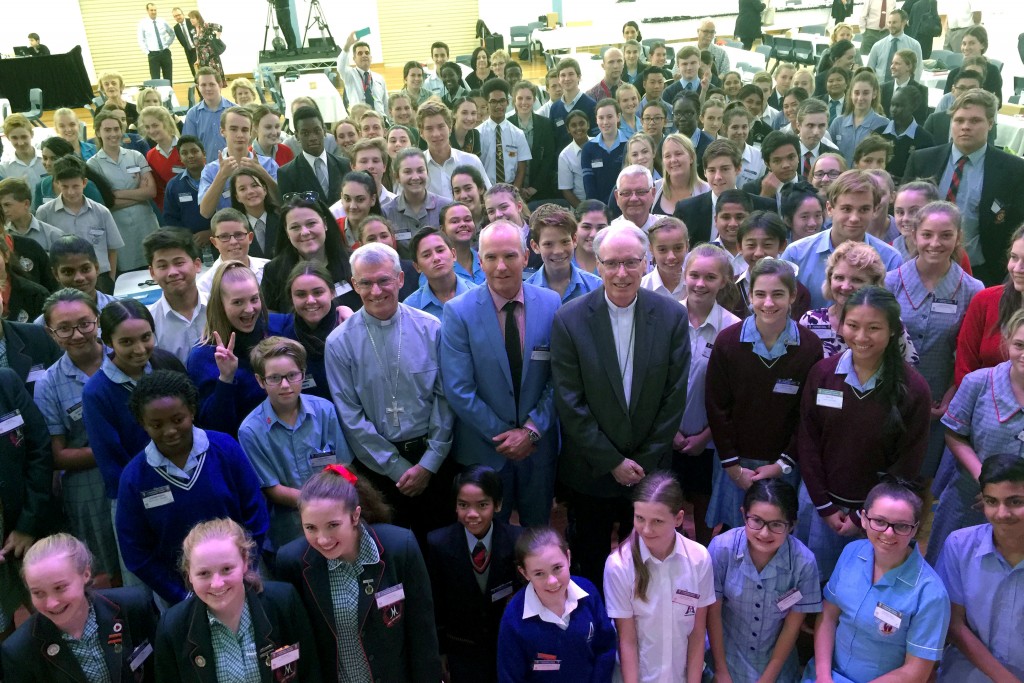
By Jamie O’Brien
Archbishop Timothy Costelloe this week challenged students to be at the very centre of transforming their school into a ‘large-hearted school, full of large-hearted people’.
The Archbishop was speaking to the students and their teachers as part of the second annual Archbishop’s Forum for Secondary Schools in support of LifeLink Day.
Schools were invited to send eight representatives to the event, which was held at Aranmore Catholic College, Leederville, on Tuesday, 5 April.
Auxiliary Bishop Don Sproxton, who is Chair of LifeLink, officially opened the event and spoke about the work of LifeLink within the Archdiocese of Perth. Students also watched a video that featured several LifeLink agency directors speaking about the work their agencies undertake in the community.
Agencies supported through LifeLink include The Shopfront, Emmaus, the Emmanuel Centre, Catholic Ministry for Deaf and Hard of Hearing, Centacare Employment and Training, Centrecare Inc, Djooraminda, Identitywa, Daydawn Advocacy Centre and Catholic Outreach.
The event was also attended by St Mary’s Leederville Parish Priest, Fr Joseph Angelo; Catholic Education Western Australia (CEWA) Executive Director, Dr Tim McDonald; CEWA Team Leader, Religious Education, Diana Alteri; as well as Aranmore Catholic College Principal, Declan Tanham.
Students were also given the opportunity to participate in a 90-minute question and answer session with Archbishop Costelloe and Bishop Sproxton.
Speaking on the theme of the Jubilee Year of Mercy, the Archbishop explained that, in announcing the Jubilee Year of Mercy, what Pope Francis is saying is that Jesus Christ is the face of the Father’s mercy.
“What he is really getting at is that mercy is ultimately one of the most fundamental aspects of God Himself, and that this God, who is mercy, has shown us what this looks like in practice by sending us His Son, Jesus, who, we might say, translates the mysterious language of divine mercy into human language – and that language is not just words, but actions, and attitudes and concrete gestures,” the Archbishop said.
“The word mercy is trying to capture the idea that a merciful person is a person whose heart moves them to have pity and compassion for those in need – and then, crucially, actually does something about it,” he said.
The Archbishop went on to talk about the story of Zacchaeus in light of the theme of mercy.
“The story of Jesus and Zacchaeus shows us what mercy looks like in practice and it helps us to understand that this is the way God always deals with us. Our God is a large-hearted God.
“In many ways, this is the key idea I want to leave with you today.”
The Archbishop encouraged those who may have trouble understanding what mercy means, or what it looks like, or explaining to themselves or others.
“Take out the word ‘mercy’ and put in the word ‘large-hearted’,” he said.
“Think to yourself, not that Pope Francis has called for a Year of Mercy, but that he has called for a year of ‘large-heartedness’.
“And then, if you begin to wonder what large-heartedness will look like, you might think that it will look like this: generosity will take the place of stinginess; gentleness will take the place of aggressiveness; forgiveness will take the place of resentment and a desire for revenge; and encouragement will take the place of negativity, bullying and gossip.”
Addressing those present, CEWA Executive Director Dr Tim McDonald said the LifeLink Day campaign reminds us of the importance of being aware of the real physical needs that are faced by the marginalised in our society, and acting on this awareness.
“Not only in society, but in our school,” Dr McDonald said.
“Pope Francis reminds us ‘that faith finds expression in everyday actions meant to help our neighbours in body and spirit’,” he said.
“We are large-hearted when we stand up for a friend who is unfairly treated in person, face to face or on-line. We are large-hearted when we share our knowledge of our studies with someone struggling, or forgive, which is the greatest form of giving, a friend or family member who has hurt you. We have many opportunities to show mercy in our everyday life.”